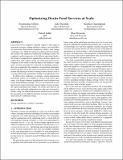| dc.contributor.author | Mellou, Konstantina | |
| dc.contributor.author | Marshall, Luke | |
| dc.contributor.author | Chintalapudi, Krishna | |
| dc.contributor.author | Jaillet, Patrick | |
| dc.contributor.author | Menache, Ishai | |
| dc.date.accessioned | 2022-07-12T17:46:20Z | |
| dc.date.available | 2022-07-12T17:46:20Z | |
| dc.date.issued | 2020 | |
| dc.identifier.uri | https://hdl.handle.net/1721.1/143688 | |
| dc.description.abstract | © 2020 ACM. Large food-service companies typically support a wide range of operations (catering, vending machines, repairs), each with different operational characteristics (manpower, vehicles, tools, timing constraints, etc.). While the advances in Internet-based technologies facilitate the adoption of automated scheduling systems, the complexity and heterogeneity of the different operations hinders the design of comprehensive optimization solutions. Indeed, our collaboration with Compass Group, one of the largest food-service companies in the world, reveals that many of its workforce assignments are done manually due to the lack of scheduling solutions that can accommodate the complexity of operational constraints. Further, the diversity in the nature of operations prevents collaboration and sharing of resources among various services such as catering and beverage distribution, leading to an inflated fleet size. To address these challenges, we design a unified optimization framework, which can be applied to various food-service operations. Our design combines neighborhood search methods and Linear Programming techniques. We test our framework on real food-service request data from a large Compass Group customer, the Puget-Sound Microsoft Campus. Our results show that our approach scales well while yielding fleet size reductions of around 2x. Further, using our unified framework to simultaneously schedule the operations of two different divisions (catering, water distribution) yields 20% additional savings. | en_US |
| dc.language.iso | en | |
| dc.publisher | ACM | en_US |
| dc.relation.isversionof | 10.1145/3397536.3422266 | en_US |
| dc.rights | Creative Commons Attribution-Noncommercial-Share Alike | en_US |
| dc.rights.uri | http://creativecommons.org/licenses/by-nc-sa/4.0/ | en_US |
| dc.source | MIT web domain | en_US |
| dc.title | Optimizing Onsite Food Services at Scale | en_US |
| dc.type | Article | en_US |
| dc.identifier.citation | Mellou, Konstantina, Marshall, Luke, Chintalapudi, Krishna, Jaillet, Patrick and Menache, Ishai. 2020. "Optimizing Onsite Food Services at Scale." GIS: Proceedings of the ACM International Symposium on Advances in Geographic Information Systems. | |
| dc.contributor.department | Sloan School of Management | |
| dc.contributor.department | Massachusetts Institute of Technology. Department of Electrical Engineering and Computer Science | |
| dc.contributor.department | Massachusetts Institute of Technology. Operations Research Center | |
| dc.relation.journal | GIS: Proceedings of the ACM International Symposium on Advances in Geographic Information Systems | en_US |
| dc.eprint.version | Author's final manuscript | en_US |
| dc.type.uri | http://purl.org/eprint/type/ConferencePaper | en_US |
| eprint.status | http://purl.org/eprint/status/NonPeerReviewed | en_US |
| dc.date.updated | 2022-07-12T17:36:38Z | |
| dspace.orderedauthors | Mellou, K; Marshall, L; Chintalapudi, K; Jaillet, P; Menache, I | en_US |
| dspace.date.submission | 2022-07-12T17:36:40Z | |
| mit.license | OPEN_ACCESS_POLICY | |
| mit.metadata.status | Authority Work and Publication Information Needed | en_US |
